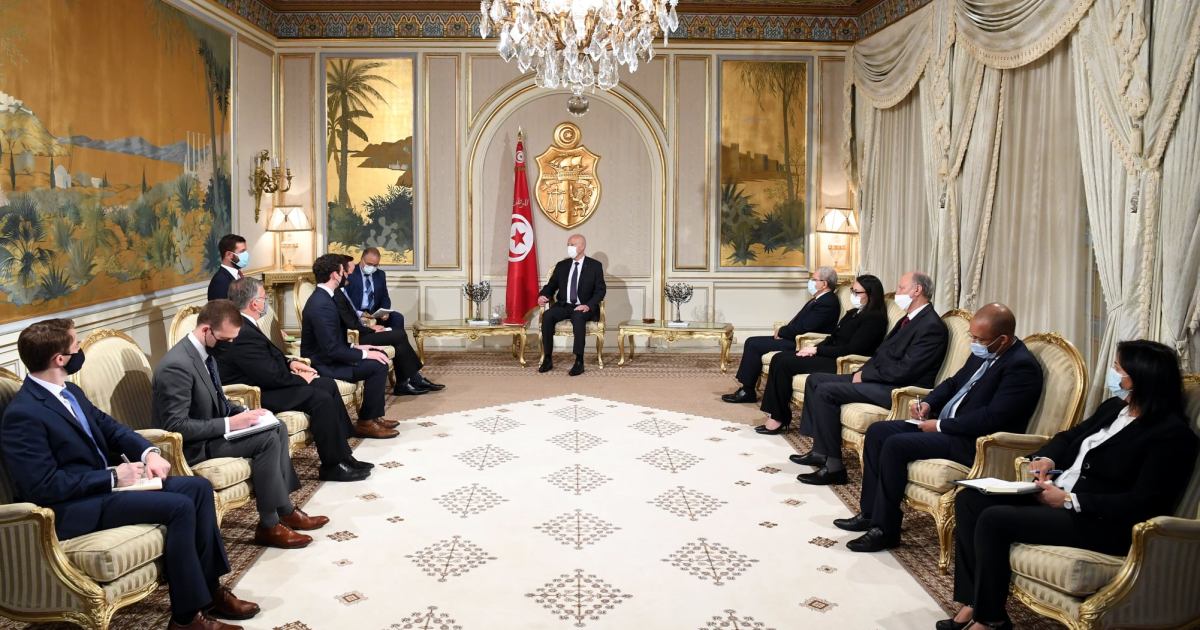Tunisian President Kais Saied said during his meeting with a delegation from the US Congress that the exceptional measures taken last July 25 "aim to protect the state from tampering and fall within the framework of respect for the constitution."
Said considered that these measures reflect a broad popular will, and called during the meeting what he described as his American friends to listen to the pulse of the street in Tunisia, as Tunisians took to the streets to celebrate the decisions of last July 25, as he put it.
While receiving the delegation, which included US Senators Chris Murphy and John Ossoff, at the presidential palace, the Tunisian president said that "some ambiguities must be raised" regarding the situation in Tunisia, and Said described those who consider what happened in Tunisia to be a coup that they do not know the law and distort it. .
Saeed had earlier announced the extension of the exceptional measures, including continuing to freeze Parliament until further notice, without revealing his program for managing the stage.
Saeed has repeatedly stated that there will be no turning back, amid expectations that he will introduce political reforms that are likely to affect the system of government and the electoral law, in addition to going to early elections to produce a new parliament.
accusations and denials
Parties in parliament, including the largest party, Ennahda, accuse the president of orchestrating a coup against the constitution and monopolizing powers, at a time when human rights organizations have criticized the subjection of people, including businessmen, judges, representatives and officials, to house arrest and the imposition of travel restrictions on the pretext of fighting corruption.
But Saeed spoke on Saturday about "ambiguities" and denied orchestrating a coup.
"The coup can only be outside the constitutional legitimacy," he said in the presence of the two congressmen.
He continued, "I used a constitutional provision to preserve the state from the imminent and pervasive danger to the country and the state."
Earlier, influential countries, including France and the United States, urged the president to put forward a road map and conduct a national dialogue on constitutional and economic reforms.
"Tunisia is a sovereign state and the sovereignty of the Tunisian people," Said, who made veiled accusations against his opponents of fueling foreign pressure, said in the presence of the two members of Congress.
I just finished meeting with Tunisian President Kais Saied at Carthage Palace.
Here's my quick readout:
1/ I urged a prompt return to the democratic path and a swift end to the emergency state.
— Chris Murphy (@ChrisMurphyCT) September 4, 2021
American position
For his part, Senator Chris Murphy tweeted on his account on "Twitter" after meeting Saeed, saying, "I urged the president to return quickly to the democratic track and quickly end the state of emergency (the exceptional situation)."
"The United States' only interest is to protect and promote a healthy democracy and economy for Tunisians," Murphy added.
Murphy emphasized that the United States will continue to support Tunisian democracy that responds to the needs of the Tunisian people and protects civil liberties and human rights.
In a related context, dozens of supporters of the Tunisian Workers' Party demonstrated on Saturday in the center of the capital, rejecting the visit of the US Congress delegation.
The Workers' Party (a leftist party that has no representatives in parliament) called for the demonstration in a statement posted on its official Facebook page, in refusal to invite the US Embassy in Tunisia to organize a meeting that brings together its representatives and a number of Tunisian representatives with the Congress delegation.
The Secretary-General of the party, Hamma Hammami, expressed his rejection of foreign interference in general, and the US, in particular, in Tunisian internal public affairs.
"We read in the visit of the American delegation an impact on the Tunisian decision, and a directive for normalization with the Zionist entity, especially after a visit by the same delegation in the past few days to the occupier state (Israel) and then to Lebanon and Greece," he said.

